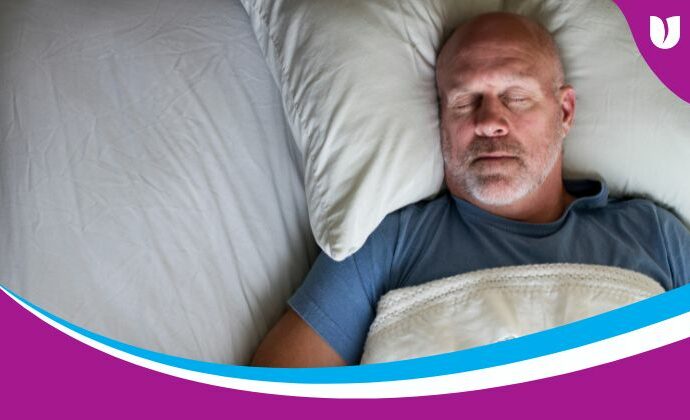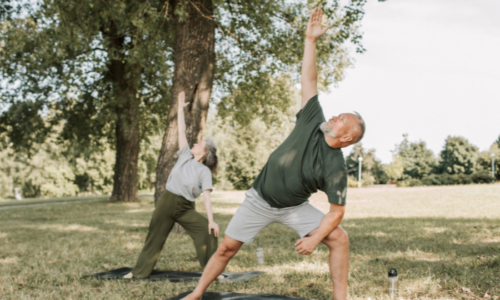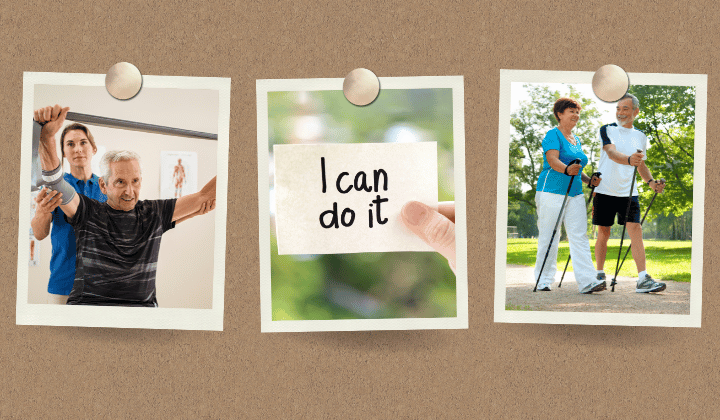Did you know that 90 percent of people with Parkinson’s suffer sleep disturbance? Here is advice from an advanced nurse practitioner, a physiotherapist and a person living with Parkinson’s about why good sleep hygiene matters.
“Have you ever been fishing and caught a fish – and it’s landed, flipping around, on the bank?” asks Matt Eagles.
He is describing his typical night in bed with Parkinson’s.
“I can be very, very still, then start flapping. My wife leans over and puts her hand on my leg or my tummy and, usually, it stops. During that time I’m semi-conscious, but it’s not a good quality of sleep.”
Throughout his 46 years of having Parkinson’s, Matt has tried many ways of getting to sleep. Like 90 percent of people living with the condition, he suffers from sleep disturbance brought on mainly by troubles with movement when lying in bed – although he admits things are not as bad as they once were. His limbs can go from being highly active, to completely rigid.
“Trying to move your legs in the middle of the night can be like you’ve got somebody else’s legs, or you’re stuck in treacle, frozen in your bed,” he says.
Years of trial and error have taught him what makes a difference. He is now a firm advocate of good sleep hygiene which, these days, involves going to bed between 22:30 to 23:00 every night, and waking up at 7:30. He aims to get at least seven hours of sleep a night.
What is sleep hygiene?
To ensure we get a good night’s sleep, the human body has an internal alarm clock that regulates our sleep-wake cycle. Keeping to a regular night-time routine, creating an ideal sleeping environment, and getting into healthy habits during the day can all help you develop good sleep hygiene.
Brian Magennis, an advanced Parkinson’s disease nurse practitioner in Dublin Ireland, thinks sleep hygiene is vital to improving your sleep.
“It’s one of the most important things I consider when assessing the sleep problems of a person who has Parkinson’s. There are other things like insomnia, urinary issues, movement problems and mind disturbances – but sleep hygiene is an obvious first step,” he says.
“If you get this right, you’ll be on your way to improving the quality and quantity of your sleep. If you still have problems, you need to talk to your doctor or neurologist, who can help adjust your medication as getting the timing and dosage of this right is essential too.”
How to get a good night’s sleep
General habits like having regular mealtimes and going to bed at the same time every night, keeping alcohol and caffeine to a minimum and ensuring your bedroom is cooler during the night have all been shown to improve the quality and quantity of your sleep.
Sleeping in total darkness and making sure you have the right bedding can also be important as Matt testifies. “We have black-out curtains in the bedroom which really help,” he says. “And a good mattress is essential. I have a memory foam mattress which is very comfy. The only issue for me is that it mimics my body shape and sometimes it means when I want to turn over, I have to climb out of the dip I’ve just created for myself!”
One thing that’s not a healthy habit is exposure to blue spectrum light before bedtime. Computer monitors, smartphones, tablet screens and televisions all produce light in the blue spectrum, which tricks the brain into believing it’s daytime, thereby reducing the production of melatonin – a hormone that helps you sleep.
Getting your nutrition right is also key to a good night’s sleep. It’s important not to eat too late and to ensure you don’t have too many high-protein foods, or carbohydrates, which can sometimes interfere with the absorption of Parkinson’s medications or be associated with poor sleep quality.
A good dose of exercise can also aid sleep quality. Physiotherapist Josefa Domingos helps people with Parkinson’s to improve their functional wellbeing.
She says: “During the day, it’s important to get proper aerobic exercise when you have Parkinson’s – not only because it potentially helps delay progression of the disease, but also because it’s been shown to improve sleep and relieve a variety of motor and non-motor symptoms.”
Stretching and slow mobility exercises before bed can also help in reducing rigidity and some discomfort during the night too, according to people with Parkinson’s.
For Matt, improving his sleep hygiene has helped to boost his energy and cope better with the condition. “Parkinson’s is exhausting,” he says. “If you wake up and you’re tired, apathy can kick in and you really don’t feel like doing anything. I think sleep is so important to Parkinson’s.”
7 ways to improve your sleep
- Keep to a regular routine, including a regular pattern of meals, exercise and going to bed and getting up – it will help your body clock get into the habit of sleeping.
- Get your nutrition right– regular mealtimes and a well-balanced Mediterranean-type diet has been shown to have therapeutic effects on sleep.
- Stay hydrated during the day, depending on your body type and needs, and avoid caffeine and alcohol which are stimulants.
- Exercise on a regular basis – how much you should do depends on your personal fitness and circumstance.
- Sleep in a cool, dark room – but take care to have some kind of lighting should you need to get up in the night.
- Upgrade your sleeping accessories– pillows, mattresses and sheets can all make the difference between a comfortable and uncomfortable night.
- Avoid electronics at least one hour before bed. Computer monitors, smartphones, tablet screens and televisions all produce blue spectrum light, which mimics daylight.
Source:









